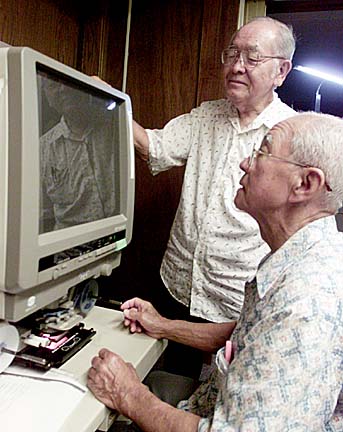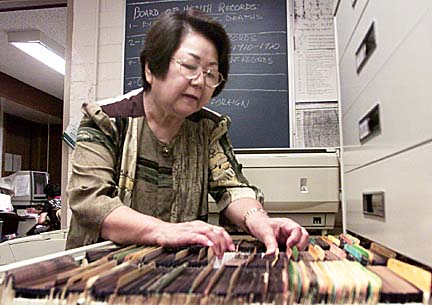


Finding your roots Give Arthur K. Koerte two hours of your time and it's quite possible he can trace your family history in Hawaii at least a century.
People research their
family tree at LDS centerBACK TO BEGINNINGS
Pat Omandam / pomandam@starbulletin.com
As one of many dedicated volunteers who work with the staff at the Kalihi Family History Center, Koerte has helped hundreds of people research their family lineage to produce an accurate and verifiable pedigree chart that goes a long way toward resolving dinner-table disputes over the good and bad apples in one's family tree.
In his words, the pedigree chart made is a "good paper."
"If you ask five people about your family history, you'll get five different stories," Koerte said. "If they like you, it's a good story; if they don't, then it's a bad story."
Located off Kalihi Street across from Farrington High School, the center is on the grounds of the Honolulu West Stake of the Church of Jesus Christ of Latter-day Saints.
The center is one of about a dozen in Hawaii that uses resources found in the LDS Church's Family History Library in Salt Lake City. The library has one of the largest collections of genealogical material in the world, and openly shares that information with church and nonchurch members through the centers.

About 200 people visit the Kalihi center each month. About two-thirds of the visitors are nonmembers of the church, said David Ikegami, center director for the past three years and a member of the LDS Church.Ikegami said the center's full-time staff and its core of volunteers knows just what documents and research is needed to track a family name, a service they have provided to many people over the years, he said.
Access to the information is free but there are minimal fees for copying. The microfiche equipment may be old, but it's in working condition, he said.
"Anybody is welcome to come," said Ikegami, who added they won't be solicited by church members.
"We don't send our missionaries after them," said Ikegami, who, with the help of his daughter, traced his family history back to the 1600s in Japan.
The Kalihi center boasts birth, marriage and death indexes that, because of federal privacy laws, start 75 years ago and goes back to about the 1860s. Also available are complete decennial census reports from 1890 and up to 1920.
The census reports from the period are all hand-written in English or Hawaiian, and generally contain the name of the person, birthplace, number of children and the name of his or her parents.
Other resources used are old obituary clippings, cemetery headstones, old church records and Hawaii shipping manifests, which are useful for descendants of Japanese, Chinese or Filipino plantation workers to help pinpoint when their ancestors arrived in Hawaii.
"Name it, we have it all," Koerte said.
Many visit the center to document their Hawaiian genealogy to qualify for Hawaiian homesteads.
The research can be done through the state Department of Health but it costs $10 per death or marriage record, he said.
Others need the lineage to claim property titles or want to see if they can trace their lineage to the ali'i lines of old Hawaii. And some less noble reasons include checking up on the family lineage of someone who is marrying into the family.
Koerte, a retired civil service worker and handyman, showed up at the center about 10 years ago to research his German genealogy, which he can now trace back to 1790.
After writing to the German government a few years ago, he discovered his grandfather, Ludwig Koerte, was one of five sons who left Germany. He was among the first German immigrants to Kauai in 1883, he said.
"Foreign countries keep fantastic records," Koerte said.
Meanwhile, Ikegami said interest in genealogical research is growing. More and more, people want to know where they came from and what kind of people they are.
The information also helps families keep in touch with relatives who may have dropped out of sight.
The Kalihi Family History Center, at 1723 Beckley St., is open from 9 a.m. to 9 p.m. Tuesday; 5-9 p.m. Wednesday; 9 a.m. to 2 p.m. Thursday; 3-9 p.m. Friday and Saturday from 9 a.m. to 2 p.m. Call 845-9701. Link up with the past
The Internet offers countless Web sites to help people trace their family trees. Here are a just few of the many easy-to-navigate sites with links to Hawaii records and databases. On the Net
http://www.lineages.com